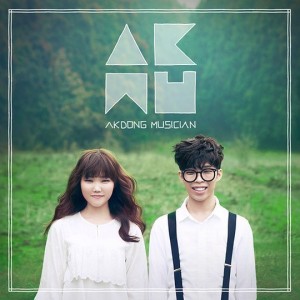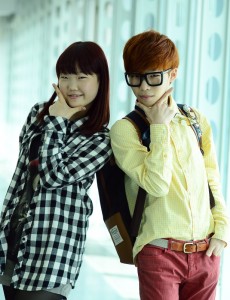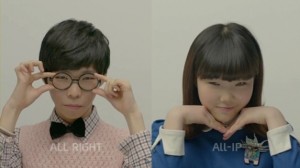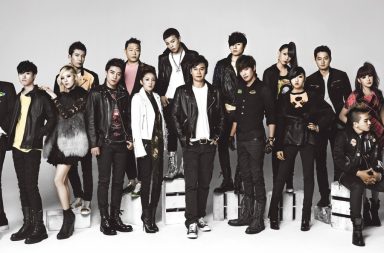 After waiting almost two years for a full-length release from the sibling duo of Lee Soo-hyun (aged fifteen) and Lee Chan-hyuk (three years older), we’re finally hearing what Akdong Musician can do with full-fledged production behind them. With the backing of YG Entertainment, the duo (now stylized as AkMu) offer their debut effort Play, an album that’s just as green and energetic as the very young singer-songwriter team.
After waiting almost two years for a full-length release from the sibling duo of Lee Soo-hyun (aged fifteen) and Lee Chan-hyuk (three years older), we’re finally hearing what Akdong Musician can do with full-fledged production behind them. With the backing of YG Entertainment, the duo (now stylized as AkMu) offer their debut effort Play, an album that’s just as green and energetic as the very young singer-songwriter team.
“Give Love” grabs your attention instantly. With a cute little greeting from Chan-hyuk, listeners are instantly transported into an album that’s all sunshine and smiling faces. You’re at first struck by just how fun the music is. It’s noticeably pop, but there’s an added dimension of something meatier, something more substantial composition-wise. Then we get a taste of Soo-hyun’s gorgeous soprano voice, and all bets are off. If the quirkiness of the brother-sister duo didn’t grab you, that voice most certainly will.
Lead single, “200%” is the perfect way to introduce the world to the group. The concept of AkMu is unique in that it’s just so fresh and so new, so natural and untouched. With a debut song that’s quintessential pop at its finest, it’s not hard to understand why the album reached the top of the charts upon its release and has stayed there. Though the opening rap is a bit… meh, the song itself is catchy and so incredibly positive you can’t help but hold a special place for it in your heart. The refrain of “It must be L.O.V.E 200 percent sure of that. I want you really I mean really” is completely precious, even more so because the vocal composition of it and the rest of the track is really fantastic.
[youtube http://youtu.be/0Oi8jDMvd_w]“Melted” is truly lovely. The simplicity of the composition belies the complexity of the imagery and the emotions inherent in it. Beginning with a simple piano and cello chord, the song is emotionally sweeping with the lovely tinkle in Soo-hyun’s voice and Chan-hyuk’s lyrics and acoustic guitar. Then as the song builds with the accompaniment of a heavier set of strings, the listener is allowed to become fully immersed in the vocals. “Melted” acts as a sort of palette cleanser after the spritely, fast-paced numbers that preceded it. It’s a heartbreaking song that adds an odd (though not entirely unwelcome) bit of melancholy to the brightness. It speaks of the coldness of loneliness that follows the loss of warmth. The harsh reality that not everything is sunny and warm places a bit of a crack in the heart upon first and second listens, perhaps because so many people can relate to that first painful letdown: “The blue ocean the red sun used to wash its face with, I look at its past warmth that has been buried deeply (too late to get it out). I wish this coldness in the world of adults would subside as well. I wish the frozen love will melt away now.”
Following the sadness of life’s harshness, we get “On the Subway,” a mellow tune that takes us through “day in the life.” It’s a welcome change of pace, highlighting that even the humdrum of everyday life holds meaning, that such moments are just as beautiful as falling in love for the first time. It has a bit of the flavor of Lianne La Havas’s “Au Cinema”—simple, leisurely, but it takes the listener on a bit of journey through the eyes of the artist. It’s a sort of journal entry of observations of the normalcy of humanity doing something as simple as riding the Metro: “In the subway, people are holding a smartphone, shaking and swaying. Guys are playing games, girls are on their homepages. Young people have their earphones in and dancing. Lovers, students, workers, everyone meets here”
 Halfway through the album we get our first real bump in the road. Unfortunately, as perfect as each piece is (and believe me, they’re ever so close), the group seems to have suffered the same tragic mistake of their idol brothers and sisters who’ve made similarly fantastic music—the dreaded rap break. “Parting” is cute pop, what you’d expect from young group. It’s not exactly that the raps are out of place in terms of the flavor of the song, but the harsh cadence and clichéd delivery just bring down the listener’s ability to simply sit through the track and enjoy it.
Halfway through the album we get our first real bump in the road. Unfortunately, as perfect as each piece is (and believe me, they’re ever so close), the group seems to have suffered the same tragic mistake of their idol brothers and sisters who’ve made similarly fantastic music—the dreaded rap break. “Parting” is cute pop, what you’d expect from young group. It’s not exactly that the raps are out of place in terms of the flavor of the song, but the harsh cadence and clichéd delivery just bring down the listener’s ability to simply sit through the track and enjoy it.
“Artificial Grass” opens with Soo-hyung humming to a grainy piece of Franco-jazz, then explodes into a summery ditty that seems to explore the inner workings of the grass under our feet. The metaphor is smart: everything is so lovely, so full of life; I wish I could enjoy it like real grass. The cheery composition contradicts the sorrow of not being able to live life fully because of the limitations of who and what you are. Truly, Chan-hyuk is a fantastic songwriter, and “Artificial Grass” highlights that perfectly with his clever use of extended metaphor.
Song “Hi (Don’t Hate Me),” one of the album’s most unique pieces with a bossa nova groove and flamenco flair that matches astonishingly well with Soo-hyun’s pure soprano, has an entire section in the middle of the song in which the siblings decide to add a bit of rhythmic poetry. Sorry to report, even their great musicianship and Chan-hyuk’s great songwriting doesn’t excuse the jarring presence of that piece of faux spoken word. It’s enough to take the listener out of the song for a couple eight counts. Which is a shame; it really is a sweet little ditty about shyly approaching your crush after admiring them from afar: “Should I approach you or not? Should I talk to you or not? Would this hello sound better or that? Would you greet me back? I only think about it again today and the opportunity leaves.” And the choice of music is intriguing and fares very well among the more traditional pop songs.
If “Artificial Grass” was a perfect example of Chan-hyuk’s ability to command metaphor, “Little Star” is a perfect expression of his songwriting brilliance. He not only uses a common children’s lullaby (“Twinkle, Twinkly Little Star,” hence the title), he uses astronomy and grounds it, making it the perfect love song: “Stars never go away, we just can’t see it. It’s just that the old sky’s eyes have gotten dim. The stars still shine.” Though Chan-hyuk adds his deeper voice to ground the harmony, it’s truly Soo-hyun’s tinkling higher register that makes this song divine. Her interpretation of her older brother’s lyrics allows the song to maintain its heavenly façade, a moment in which both singer and songwriter are completely in-synch with each other’s musical vision.
 By the ninth song on the album the musical composition becomes just a bit redundant. However, the lyricism and the purity of Soo-hyun’s voice more than compensate for the dip in compositional creativity. Thus song “Anyway,” a track about putting on airs in front of someone in order to impress them, only to regret having snubbed them for the sake of appearing cool: “When the same sex meets on the street, there’s a power struggle. When the opposite sex meets on the street, they pretend to be chic. But then if there’s a person who captivates my heart I’ll still act chic. Even when I fell for you at first sight, I still acted chic. But after I come home, I regretted it.” It’s so simple yet so incredibly relatable. Therein lay the brilliance of Chan-hyuk. He’s managed to write lyrics that are most certainly poetic, but they’re so honest. Without the pretense of the title “artist,” each song easily captivates the listening audience.
By the ninth song on the album the musical composition becomes just a bit redundant. However, the lyricism and the purity of Soo-hyun’s voice more than compensate for the dip in compositional creativity. Thus song “Anyway,” a track about putting on airs in front of someone in order to impress them, only to regret having snubbed them for the sake of appearing cool: “When the same sex meets on the street, there’s a power struggle. When the opposite sex meets on the street, they pretend to be chic. But then if there’s a person who captivates my heart I’ll still act chic. Even when I fell for you at first sight, I still acted chic. But after I come home, I regretted it.” It’s so simple yet so incredibly relatable. Therein lay the brilliance of Chan-hyuk. He’s managed to write lyrics that are most certainly poetic, but they’re so honest. Without the pretense of the title “artist,” each song easily captivates the listening audience.
With its hodge-podge composition, “Idea” is the album’s most disappointing track musically. The composition doesn’t at all mesh with the voices; the interspersed bits of pure acoustic “indie” pop conflicts with the desire for the song to be the perfect YG machination. It’s almost ironic that the first few lines of the song indicate that even the protagonist was at a loss as to what his direction should be within the confines of the song: “My head can’t follow along with my heart these days. I’m really motivated but I’m out of ideas. Is there anyone who wants to be the subject of my story?”
In a bit of odd placement, song “Galaxy” comes through almost as out of this world as its title suggests. It’s beautifully composed lyrically and vocally. The Lee siblings are so harmonious the audience is easily transported into another place and time, somewhere tinted with their special flavor of cutesy and unique pop. Though it follows the album’s most disappointing track, it also ends the album on a very spritely and uplifting note. Chan-hyuk uses imagery so well throughout Play, and “Galaxy” is no exception. One can literally imagine an endless sky of stars, staring up into the inky blackness while the stars shimmer on a midsummer night: “At the end of deep thought, I couldn’t confess to you because of the sound of the midsummer rain. Did it float off to the Milky Way that is faintly shining in the sky?”
 If there’s one thing truly magnificent about this group it’s the ability to match concept and lyrics, lyrics and vocal delivery. For the most part, the rapping is just ill-placed and random. It does make sense, in that “hey, this is YG” sort of way. But that doesn’t make it any less jarring when songs that are actually perfectly fine without it seemingly throw it in for good measure. That being said, the rest of the album is definitely a surprising mix of heavy acoustic pop and sugary sweet quips about the joy and strangeness of falling in love. Play takes the self-same themes of young love and adds a layer of lyrical and often times musical complexity that makes this debut actually one of the best of the year thus far. Lovely songwriting and a crystalline vocal performance are what make Play a truly marvelous stepping stone for the young group.
If there’s one thing truly magnificent about this group it’s the ability to match concept and lyrics, lyrics and vocal delivery. For the most part, the rapping is just ill-placed and random. It does make sense, in that “hey, this is YG” sort of way. But that doesn’t make it any less jarring when songs that are actually perfectly fine without it seemingly throw it in for good measure. That being said, the rest of the album is definitely a surprising mix of heavy acoustic pop and sugary sweet quips about the joy and strangeness of falling in love. Play takes the self-same themes of young love and adds a layer of lyrical and often times musical complexity that makes this debut actually one of the best of the year thus far. Lovely songwriting and a crystalline vocal performance are what make Play a truly marvelous stepping stone for the young group.
4.25/5
(YG Life, Wall Street Journal, YouTube, Korea Herald, Genie, Jpop Asia, 10Asia, Lyrics from Pop Gasa)


